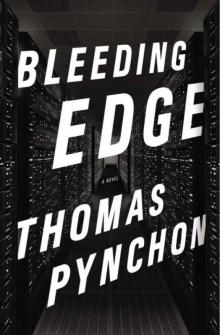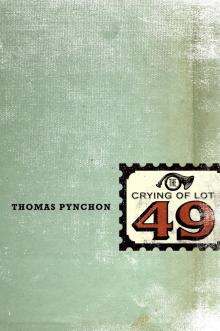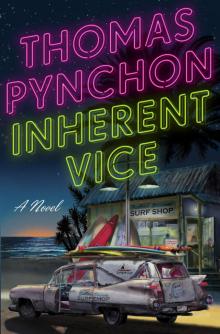- Home
- Thomas Pynchon
Inherent Vice
Inherent Vice Read online
THOMAS PYNCHON
The Penguin Press
New York
2012
THE PENGUIN PRESS
Published by the Penguin Group
Penguin Group (USA) Inc., 375 Hudson Street, New York, New York 10014, U.S.A.
Penguin Group (Canada), 90 Eglinton Avenue East, Suite 700, Toronto, Ontario, Canada M4P 2Y3 (a division of Pearson Penguin Canada Inc.)
Penguin Books Ltd, 80 Strand, London WC2R 0RL, England
Penguin Ireland, 25 St. Stephen’s Green, Dublin 2, Ireland (a division of Penguin Books Ltd)
Penguin Books Australia Ltd, 250 Camberwell Road, Camberwell, Victoria 3124, Australia (a division of Pearson Australia Group Pty Ltd)
Penguin Books India Pvt Ltd, 11 Community Centre, Panchsheel Park, New Delhi – 110 017, India
Penguin Group (NZ), 67 Apollo Drive, Rosedale, Auckland 0632, New Zealand (a division of Pearson New Zealand Ltd)
Penguin Books (South Africa) (Pty) Ltd, 24 Sturdee Avenue, Rosebank, Johannesburg 2196, South Africa
Penguin Books Ltd, Registered Offices:
80 Strand, London WC2R 0RL, England
This edition published in 2012 by The Penguin Press,
a member of Penguin Group (USA) Inc.
Copyright © Thomas Pynchon, 2009
All rights reserved
Originally published by The Penguin Press, 2009
Publisher’s Note
This is a work of fiction. Names, characters, places, and incidents either are the product of the author’s imagination or are used fictitiously, and any resemblance to actual persons, living or dead, business establishments, events, or locales is entirely coincidental.
ISBN 978-1-101-59467-4
No part of this book may be reproduced, scanned, or distributed in any printed or electronic form without permission. Please do not participate in or encourage piracy of copyrighted materials in violation of the author’s rights. Purchase only authorized editions.
Under the paving-stones, the beach!
GRAFFITO, PARIS, MAY 1968
CONTENTS
ONE
TWO
THREE
FOUR
FIVE
SIX
SEVEN
EIGHT
NINE
TEN
ELEVEN
TWELVE
THIRTEEN
FOURTEEN
FIFTEEN
SIXTEEN
SEVENTEEN
EIGHTEEN
NINETEEN
TWENTY
TWENTY-ONE
ONE
SHE CAME ALONG THE ALLEY AND UP THE BACK STEPS THE WAY she always used to. Doc hadn’t seen her for over a year. Nobody had. Back then it was always sandals, bottom half of a flower-print bikini, faded Country Joe & the Fish T-shirt. Tonight she was all in flatland gear, hair a lot shorter than he remembered, looking just like she swore she’d never look.
“That you, Shasta?”
“Thinks he’s hallucinating.”
“Just the new package I guess.”
They stood in the streetlight through the kitchen window there’d never been much point putting curtains over and listened to the thumping of the surf from down the hill. Some nights, when the wind was right, you could hear the surf all over town.
“Need your help, Doc.”
“You know I have an office now? just like a day job and everything?”
“I looked in the phone book, almost went over there. But then I thought, better for everybody if this looks like a secret rendezvous.”
Okay, nothing romantic tonight. Bummer. But it still might be a paying gig. “Somebody’s keepin a close eye?”
“Just spent an hour on surface streets trying to make it look good.”
“How about a beer?” He went to the fridge, pulled two cans out of the case he kept inside, handed one to Shasta.
“There’s this guy,” she was saying.
There would be, but why get emotional? If he had a nickel for every time he’d heard a client start off this way, he could be over in Hawaii now, loaded day and night, digging the waves at Waimea, or better yet hiring somebody to dig them for him . . . “Gentleman of the straightworld persuasion,” he beamed.
“Okay, Doc. He’s married.”
“Some . . . money situation.”
She shook back hair that wasn’t there and raised her eyebrows so what.
Groovy with Doc. “And the wife—she knows about you?”
Shasta nodded. “But she’s seeing somebody too. Only it isn’t just the usual—they’re working together on some creepy little scheme.”
“To make off with hubby’s fortune, yeah, I think I heard of that happenin once or twice around L.A. And . . . you want me to do what, exactly?” He found the paper bag he’d brought his supper home in and got busy pretending to scribble notes on it, because straight-chick uniform, makeup supposed to look like no makeup or whatever, here came that old well-known hardon Shasta was always good for sooner or later. Does it ever end, he wondered. Of course it does. It did.
They went in the front room and Doc laid down on the couch and Shasta stayed on her feet and sort of drifted around the place.
“Is, they want me in on it,” she said. “They think I’m the one who can reach him when he’s vulnerable, or as much as he ever gets.”
“Bareass and asleep.”
“I knew you’d understand.”
“You’re still trying to figure out if it’s right or wrong, Shasta?”
“Worse than that.” She drilled him with that gaze he remembered so well. When he remembered. “How much loyalty I owe him.”
“I hope you’re not asking me. Beyond the usual boilerplate people owe anybody they’re fucking steady—”
“Thanks, Dear Abby said about the same thing.”
“Groovy. Emotions aside, then, let’s look at the money. How much of the rent’s he been picking up?”
“All of it.” Just for a second, he caught the old narrow-eyed defiant grin.
“Pretty hefty?”
“For Hancock Park.”
Doc whistled the title notes from “Can’t Buy Me Love,” ignoring the look on her face. “You’re givin him IOUs for everything, o’ course.”
“You fucker, if I’d known you were still this bitter—”
“Me? Trying to be professional here, is all. How much were wifey and the b.f. offering to cut you in for?”
Shasta named a sum. Doc had outrun souped-up Rollses full of indignant smack dealers on the Pasadena Freeway, doing a hundred in the fog and trying to steer through all those crudely engineered curves, he’d walked up back alleys east of the L.A. River with nothing but a borrowed ’fro pick in his baggies for protection, been in and out of the Hall of Justice while holding a small fortune in Vietnamese weed, and these days had nearly convinced himself all that reckless era was over with, but now he was beginning to feel deeply nervous again. “This . . .” carefully now, “this isn’t just a couple of X-rated Polaroids, then. Dope planted in the glove compartment, nothin like ’at . . .”
Back when, she could go weeks without anything more complicated than a pout. Now she was laying some heavy combination of face ingredients on him that he couldn’t read at all. Maybe something she’d picked up at acting school. “It isn’t what you’re thinking, Doc.”
“Don’t worry, thinking comes later. What else?”
“I’m not sure but it sounds like they want to commit him to some loony bin.”
“You mean legally? or a snatch of some kind?”
“Nobody’s telling me, Doc, I’m just the bait.” Come to think of it, there’d never been this much sorrow in her voice either. “I heard you’re seeing somebody downtown?”
Seeing. Well, “Oh, you mean Penny? nice flatland chick, out in search of secret hippie love thrills basically—”
“Also some kind of junior DA in Evelle Younger’s shop?”
Doc gave it some thought. “You think somebody there can stop this before it happens?”
“Not too many places I can go with this, Doc.”
“Okay, I’ll talk to Penny, see what we can see. Your happy couple—they have names, addresses?”
When he heard her older gent’s name he said, “This is the same Mickey Wolfmann who’s always in the paper? The real-estate big shot?”
“You can’t tell anybody about this, Doc.”
“Deaf and dumb, part of the job. Any phone numbers you’d like to share?”
She shrugged, scowled, gave him one number. “Try to never use it.”
“Groovy, and how do I reach you?”
“You don’t. I moved out of the old place, staying where I can anymore, don’t ask.”
He almost said, “There’s room here,” which in fact there wasn’t, but he’d seen her looking around at everything that hadn’t changed, the authentic English Pub Dartboard up on the wagon wheel and the whorehouse swag lamp with the purple psychedelic bulb with the vibrating filament, the collection of model hot rods made entirely of Coors cans, the beach volleyball autographed by Wilt Chamberlain in Day-Glo felt marker, the velvet painting and so forth, with an expression of, you would have to say, distaste.
He walked her down the hill to where she was parked. Weeknights out here weren’t too different from weekends, so this part of town was already all ahoot with funseekers, drinkers and surfers screaming in the alleys, dopers out on food errands, flatland guys in for a night of hustling stewardesses, flatland ladies with all-too-grounded day jobs hoping to be mistaken for stewardesses. Uphill and invisible, traffic out on the boulevard to and from the freeway uttered tuneful exhaust phrases which went echoing out to sea, where the crews of oil tankers sliding along, hearing them, could have figured it for wildlife taking care of nighttime business on an exotic coast.
In the last pocket of darkness before the glare of Beachfront Drive, they came to a pause, a timeless pedestrian gesture in these parts that usually announced a kiss or at least a grabbed ass. But she said, “Don’t come any further, somebody might be watching by now.”
“Call me or something.”
“You never did let me down, Doc.”
“Don’t worry. I’ll—”
“No, I mean really ever.”
“Oh . . . sure I did.”
“You were always true.”
It had been dark at the beach for hours, he hadn’t been smoking much and it wasn’t headlights—but before she turned away, he could swear he saw light falling on her face, the orange light just after sunset that catches a face turned to the west, watching the ocean for someone to come in on the last wave of the day, in to shore and safety.
At least her car was the same, the Cadillac ragtop she’d had forever, a ’59 Eldorado Biarritz bought used at one of the lots over on Western where they stand out close to the traffic so it’ll sweep away the smell of whatever they’re smoking. After she drove away, Doc sat on a bench down on the Esplanade, a long slopeful of lighted windows ascending behind him, and watched the luminous blooms of surf and the lights of late commuter traffic zigzagging up the distant hillside of Palos Verdes. He ran through things he hadn’t asked, like how much she’d come to depend on Wolfmann’s guaranteed level of ease and power, and how ready was she to go back to the bikini and T-shirt lifestyle, and how free of regrets? And least askable of all, how passionately did she really feel about old Mickey? Doc knew the likely reply—“I love him,” what else? With the unspoken footnote that the word these days was being way too overused. Anybody with any claim to hipness “loved” everybody, not to mention other useful applications, like hustling people into sex activities they might not, given the choice, much care to engage in.
Back at his place, Doc stood for a while gazing at a velvet painting from one of the Mexican families who set up their weekend pitches along the boulevards through the green flatland where people still rode horses, between Gordita and the freeway. Out of the vans and into the calm early mornings would come sofa-width Crucifixions and Last Suppers, outlaw bikers on elaborately detailed Harleys, superhero badasses in Special Forces gear packing M16s and so forth. This picture of Doc’s showed a Southern California beach that never was—palms, bikini babes, surfboards, the works. He thought of it as a window to look out of when he couldn’t deal with looking out of the traditional glass-type one in the other room. Sometimes in the shadows the view would light up, usually when he was smoking weed, as if the contrast knob of Creation had been messed with just enough to give everything an underglow, a luminous edge, and promise that the night was about to turn epic somehow.
Except for tonight, which only looked more like work. He got on the telephone and tried to call Penny, but she was out, probably Watusi-ing the night away opposite some shorthaired attorney with a promising career. Cool with Doc. Next he rang up his Aunt Reet, who lived down the boulevard on the other side of the dunes in a more suburban part of town with houses, yards, and trees, because of which it had become known as the Tree Section. A few years ago, after divorcing a lapsed Missouri Synod Lutheran with a T-Bird agency and a fatality for the restless homemakers one meets at bars in bowling alleys, Reet had moved down here from the San Joaquin with the kids and started selling real estate, and before long she had her own agency, which she now ran out of a bungalow on the same oversize lot as her house. Whenever Doc needed to know anything touching on the world of property, Aunt Reet, with her phenomenal lot-by-lot grasp of land use from the desert to the sea, as they liked to say on the evening news, was the one he went to. “Someday,” she prophesied, “there will be computers for this, all you’ll have to do’s type in what you’re looking for, or even better just talk it in—like that HAL in 2001: A Space Odyssey?—and it’ll be right back at you with more information than you’d ever want to know, any lot in the L.A. Basin, all the way back to the Spanish land grants—water rights, encumbrances, mortgage histories, whatever you want, trust me, it’s coming.” Till then, in the real non-sci-fi world, there was Aunt Reet’s bordering-on-the-supernatural sense of the land, the stories that seldom appeared in deeds or contracts, especially matrimonial, the generations of family hatreds big and small, the way the water flowed, or used to.
She picked up on the sixth ring. The TV set was loud in the background.
“Make it quick, Doc, I’ve got a live one tonight and a quarter ton of makeup to put on yet.”
“What can you tell me about Mickey Wolfmann?”
If she took even a second to breathe, Doc didn’t notice. “Westside Hochdeutsch mafia, biggest of the big, construction, savings and loans, untaxed billions stashed under an Alp someplace, technically Jewish but wants to be a Nazi, becomes exercised often to the point of violence at those who forget to spell his name with two n’s. What’s he to you?”
Doc gave her a rundown on Shasta’s visit and her account of the plot against the Wolfmann fortune.
“In the real-estate business,” Reet remarked, “God knows, few of us are strangers to moral ambiguity. But some of these developers, they make Godzilla look like a conservationist, and you might not care to get into this, Larry. Who’s paying you?”
“Well . . .”
“All on spec, eh? big surprise. Listen, if Shasta can’t pay you, maybe that means Mickey’s dumped her, and she’s blaming the wife and wants revenge.”
“Possible. But say I just wanted to
hang out and rap with this Wolfmann dude?”
Was that an exasperated sigh? “I wouldn’t recommend your usual approach. He goes around with a dozen bikers, mostly Aryan Brotherhood alumni, to watch his back, all court-certified badasses. Try making an appointment for once.”
“Wait a minute, I ditched social-studies class a lot, but . . . Jews and the AB . . . Isn’t there . . . something about, I forget . . . hatred?”
“The book on Mickey is, is he’s unpredictable. More and more lately. Some would say eccentric. I would say stoned out of his fuckin mind, nothing personal.”
“And this goon squad, they’re loyal to him, even if when they were in the place they took some oath with maybe a anti-Semitic clause in it here and there?”
“Drive within ten blocks of the man, they’ll lie down in front of your car. Keep coming, they’ll roll a grenade. You want to talk to Mickey, don’t be spontaneous, don’t even be cute. Go through channels.”
“Yeah, but I also don’t want to get Shasta in trouble. Where do you think I could run into him, like, accidentally?”
“I promised my kid sister I’d never put her baby in the way of danger.”
“I’m cool with the Brotherhood, Aunt Reet, know the handshake and everything.”
“All right, it’s your ass, kid, I have major liquid-liner issues to deal with here, but I’m told Mickey’s been spending time out at his latest assault on the environment—some chipboard horror known as Channel View Estates?”
“Oh yeah, that. Bigfoot Bjornsen does commercials for them. Interrupting strange movies you’ve never heard of.”
“Well, maybe your old cop buddy’s the one who should be taking care of this. Have you been in touch with the LAPD?”
“I did think of going to Bigfoot,” Doc said, “but just as I was reaching for the phone I remembered how, being Bigfoot and all, he’d probably try to pop me for the whole thing.”
“Maybe you’re better off with the Nazis, I don’t envy you the choice. Be careful, Larry. Check in now and then just so I can reassure Elmina that you’re still alive.”

 Mason & Dixon
Mason & Dixon Against the Day
Against the Day Uncollected Works
Uncollected Works Bleeding Edge
Bleeding Edge Gravity's Rainbow
Gravity's Rainbow The Crying of Lot 49
The Crying of Lot 49 V.
V. Inherent Vice
Inherent Vice Vineland
Vineland